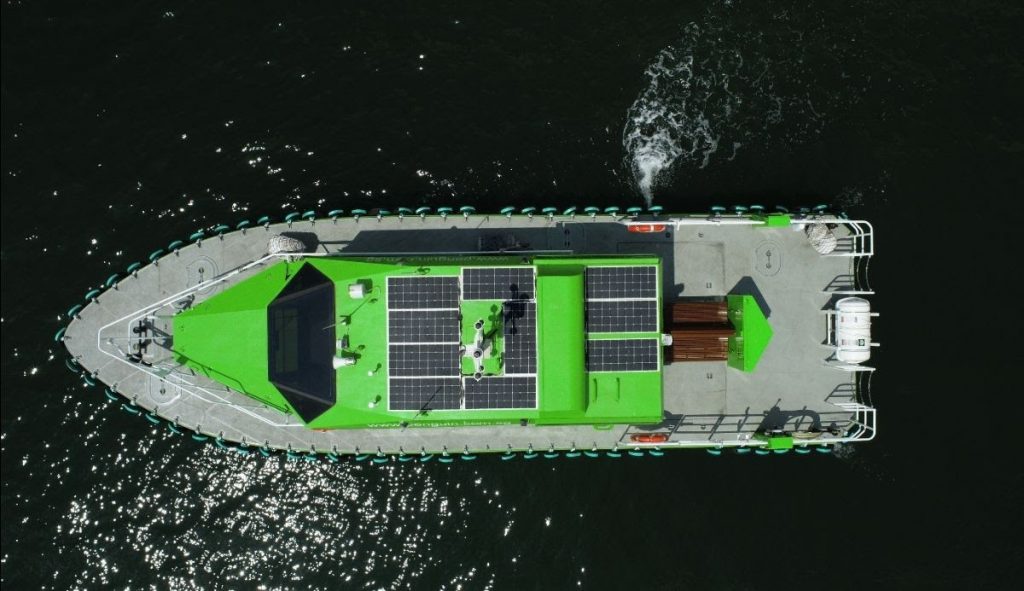Singapore’s first hybrid electric ship classed by Bureau Veritas

20 April 2021 – Bureau Veritas (BV), a world leader in testing, inspection, and certification (TIC), has certified and classed Singapore’s first hybrid-powered ship. Built, owned and operated by Singapore-based Penguin Shipyard International, a subsidiary of Penguin International Limited (“Penguin”), Penguin Tenaga is a 15-meter, 12-passenger aluminum pilot boat capable of entirely running in electric mode at five knots for more than 30 minutes, and in conventional diesel mode can reach a maximum speed of 24 knots.
The vessel design is based on the same hull form as two of Penguin’s existing monohull pilot boats that are currently operating for Shell Eastern Petroleum in Singapore.
Penguin Tenaga is classed under BV with the notation Electric Hybrid and Zero Emission (“ZE”) mode. This notation provides operational and environmental benefits. It helps to ensure the systems operate safely and efficiently, as well as reduce fuel consumption, local air emissions and noise when in proximity to centers of population. BV assisted Penguin by providing guidance on the BV rules and advice to Sea Forrest Power Solutions Pte Ltd (a subsidiary of BH Global Corporation Limited) towards certification of the equipment on board, such as the hybrid electric propulsion systems installed on the vessel.
In addition, solar panels installed on the roof of Penguin Tenaga provide electrical energy that is used to recharge mobile devices on board and supplement the vessel’s “hotel load”.
Singapore, one of the world’s largest and busiest ports, has pledged to reduce greenhouse emissions by 36% by 2030, when compared to 2005 levels. This shipbuilding project is an important step towards Singapore’s environmentally sustainable future and meeting its own green targets.
In a bid to reduce emissions, Singapore is taking a lead in developing hybrid-electric propulsion technology for offshore support and harbor vessels. Currently, there are limited applications for pure electric vessels in Singapore due to the lack of charging infrastructure. However, this could change in coming years as the country electrifies its maritime eco-system to meet the IMO sustainability targets as well as its own sustainability goals. BV has also created a comprehensive guidelines and rules to help the ship owners and builders move towards sustainability powered vessels.
David Barrow, Marine & Offshore, Vice-President South Asia and Pacific, Bureau Veritas commented: “This project is a fantastic step in our industry’s decarbonization journey and continues to demonstrate the innovative strategy being adopted throughout the Singapore Marine Cluster. We have been delighted to support Penguin and the other stakeholders in the unique project. Working in a truly collaborative way, we have all ensured a successful project delivery. The forward looking strategy by Penguin has to be a leading example of what we can achieve in meeting our sustainability goals and targets.”
James Tham, Penguin’s Managing Director, said: “In the early days, when we were still in the conceptual phase of this hybrid project, we were faced with many variables and uncertainties. However, one thing that we were certain about was the choice of Bureau Veritas as our classification partner. Bureau Veritas’ Singapore team brought to this project their valuable knowhow and expertise in hybrid-powered ships”
This landmark project is a collaboration of Penguin, Danfoss Power Solutions Pte Ltd, Durapower Technology (Singapore) Pte Ltd, ZF Asia Pacific Pte. Ltd., BH Global Corporation Ltd (“BH Global”) and BV.





